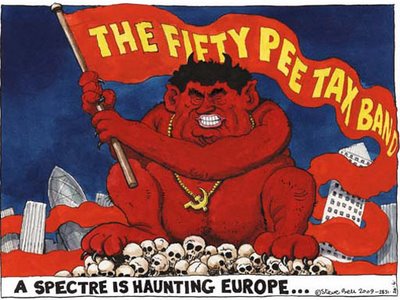Tomorrow never comes until it's too late (or, the Budget).
Amidst the knockabout and the political dividing lines, there was a budget attempting to break out from Alistair Darling's speech. The one thing you can always depend upon is that those on both sides will respond with plenty of vitriol and very little on what they would do instead, as David Cameron did, in almost certainly one of his very weakest performances at the dispatch box. He, or almost certainly rather his writers probably thought that their football metaphor was clever while being easy to understand for all the plebs out there, describing the country as having gone from the top of the Premier League in 1997 to the Conference in 2010 after 13 wasted years. Supposedly meant to refer to Brown wanting to appear on Match of the Day, it instead just struck you as a politician resorting to hyperbole when he has absolutely nothing else to add, and which falls apart on first examination: was the country really in such fantastic shape in 97? Is it really so desperate now? What exactly would the Conservatives have done to make such a dramatic difference when in 2005 the spending pledges from the Conservatives were only £4 billion short of Labour's?
On the opposite side, you have the supposedly "non-partisan" Left Foot Forward doing the equivalent of trying to thrust their collective tongue down Darling's throat, celebrating almost every separate investment decision taken while downplaying the taking away with the other hand. Sally Hunt rather undermines the "welcome news" that the government will fund 200,00 "extra" university places when she notes that the £270m in extra funding doesn't even begin to make up for the cuts which have already been announced. She also doesn't mention that the government is to sell off the student loan book to the highest bidder, something you think might be of concern to the general secretary of the University and College Union.
Budgets tend to begin falling apart the following day or even the day after that once all the details have sunk in, the sums have been done by the likes of the Institute for Fiscal Studies and the Treasury red book has been thoroughly examined. It didn't even last that long when it came to the headline raising of the stamp duty threshold to £250,000 for first time buyers. The cost of doing so, heavily cheered by the Labour benches, is meant to be covered by raising the stamp duty on properties over a million from 4% to 5%, except it doesn't. It's estimated that will bring in £90m, while raising the threshold to £250k will cost £230m. Why bother to raise it by such a measly amount when it doesn't even begin to cover it? We're not talking about the so-called "squeezed middle" here, but the very well off who can comfortably afford to pay more. It is essentially a trick, used throughout the budget and especially by Brown since his ascension to prime minister: giving the appearance of soaking the rich while doing nothing of the sort. How much further Labour could have gone has been aptly illustrated by the one-off banker bonus tax: despite all the screams from the City, it raised more than double the predicted amount, helping to fund the "giveaways" which we had been told weren't going to happen.
Even if the real cuts are being postponed to after the election or until the next fiscal year, which is incidentally the right thing to do, we still have the cuts masquerading as "efficiency savings" which were announced afterwards. A staggering £4.3bn is apparently to be saved from the Department of Health budget, of which £555m is due to come by reducing "sickness absence", which translated means forcing nurses and doctors to go into work when they themselves are unwell, an idea with absolutely no drawbacks whatsoever. Another £100m will be saved from the disastrous IT programme, which even by this government's standards of waste has broken new records in terms of misuse of public money. Speaking of which, another £4bn is to be thrown into the spending chasm known as Afghanistan, a war without end and which only gets crazier as the years inexorably pass.
If the budget and the responses to it were designed to further cement the votes if not the themes on which the election campaign is going to be fought, then both could be classed as relative successes. Toby Helm describes it as anything but a boring budget, but I beg to differ, as I presume Darling himself would. The surprises were so few as to be non-existent, and away from the Ashcroft-bashing, this was hardly the budget on which any governing party would like to be going into an election. The deficit and borrowing figures prevented it being any sort of giveaway, but it also focused on the short-term at the expense of anything approaching a vision. We had a stamp duty cut for those who can already afford to buy, but nothing for those who can't or who can't even find anywhere to live. From both sides we were offered a continuation of the same old politics even when they supposedly thirst to offer everyone change, and a tomorrow which they deeply seem to hope will never come.
On the opposite side, you have the supposedly "non-partisan" Left Foot Forward doing the equivalent of trying to thrust their collective tongue down Darling's throat, celebrating almost every separate investment decision taken while downplaying the taking away with the other hand. Sally Hunt rather undermines the "welcome news" that the government will fund 200,00 "extra" university places when she notes that the £270m in extra funding doesn't even begin to make up for the cuts which have already been announced. She also doesn't mention that the government is to sell off the student loan book to the highest bidder, something you think might be of concern to the general secretary of the University and College Union.
Budgets tend to begin falling apart the following day or even the day after that once all the details have sunk in, the sums have been done by the likes of the Institute for Fiscal Studies and the Treasury red book has been thoroughly examined. It didn't even last that long when it came to the headline raising of the stamp duty threshold to £250,000 for first time buyers. The cost of doing so, heavily cheered by the Labour benches, is meant to be covered by raising the stamp duty on properties over a million from 4% to 5%, except it doesn't. It's estimated that will bring in £90m, while raising the threshold to £250k will cost £230m. Why bother to raise it by such a measly amount when it doesn't even begin to cover it? We're not talking about the so-called "squeezed middle" here, but the very well off who can comfortably afford to pay more. It is essentially a trick, used throughout the budget and especially by Brown since his ascension to prime minister: giving the appearance of soaking the rich while doing nothing of the sort. How much further Labour could have gone has been aptly illustrated by the one-off banker bonus tax: despite all the screams from the City, it raised more than double the predicted amount, helping to fund the "giveaways" which we had been told weren't going to happen.
Even if the real cuts are being postponed to after the election or until the next fiscal year, which is incidentally the right thing to do, we still have the cuts masquerading as "efficiency savings" which were announced afterwards. A staggering £4.3bn is apparently to be saved from the Department of Health budget, of which £555m is due to come by reducing "sickness absence", which translated means forcing nurses and doctors to go into work when they themselves are unwell, an idea with absolutely no drawbacks whatsoever. Another £100m will be saved from the disastrous IT programme, which even by this government's standards of waste has broken new records in terms of misuse of public money. Speaking of which, another £4bn is to be thrown into the spending chasm known as Afghanistan, a war without end and which only gets crazier as the years inexorably pass.
If the budget and the responses to it were designed to further cement the votes if not the themes on which the election campaign is going to be fought, then both could be classed as relative successes. Toby Helm describes it as anything but a boring budget, but I beg to differ, as I presume Darling himself would. The surprises were so few as to be non-existent, and away from the Ashcroft-bashing, this was hardly the budget on which any governing party would like to be going into an election. The deficit and borrowing figures prevented it being any sort of giveaway, but it also focused on the short-term at the expense of anything approaching a vision. We had a stamp duty cut for those who can already afford to buy, but nothing for those who can't or who can't even find anywhere to live. From both sides we were offered a continuation of the same old politics even when they supposedly thirst to offer everyone change, and a tomorrow which they deeply seem to hope will never come.
Labels: 2010 election campaign, Alistair Darling, Conservatives, David Cameron, New Labour, politics, the budget



